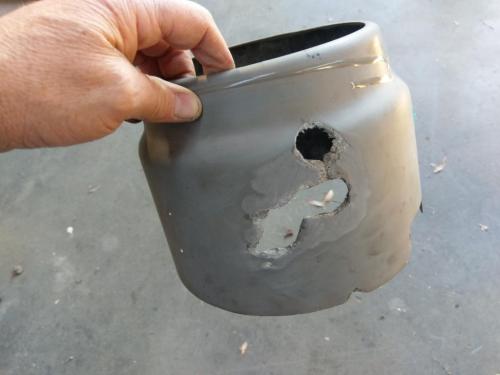I've been doing a few bits and pieces in preparation for painting the conversion parts. The motor cowl was beaten up and in need of some TLC, looks like it has received a blow from something that has not only put a hole in it but also broken the four screw holes out of the bottom rim.

I had some fibreglass offcuts and leftover epoxy from my canoe build 10 years ago, probably pushing the shelf-life envelope but it was expensive stuff. Also some release agent from a forgotten project that pre-dates the canoe build by several years. I cleaned up a good section of the cowl on the side opposite the damage, coated it with release agent and then laid a few layers of fibreglass cloth over it and brushed the epoxy in. Let it set up overnight.

I was a bit worried about the stale release agent, it was quite a bit more viscous than when I last used it and I have no idea what to thin it with so used it as-is. The repair mould came away nicely.

I cut out the damaged section and taped the negative over the hole after coating it with the release agent

and patched the hole from inside. Left it for a couple of days. Seems to have got the shape into the repair pretty well, the imperfections should respond to spray-putty during the painting process.

I also cut out the broken sections around the rim where the four mounting screws go, repaired them one at a time as the epoxy is very runny, can't rotate the job until the previous patch has set up. Today I cut off the excess, marked and drilled the holes and smoothed the bottom edge.

The top cowl piece is missing, parts suppliers want about $80+ for it which is out of the question. I'm thinking I might see if I can pick up some kind of vintage chrome hubcap of a suitable diameter.
I spent a few hours with some flap wheels, blending the sharp edges and corners on all the mounting pieces. I think they should look acceptable once painted and re-mounted. For interest sake I weighed the new parts, 61.5kg or 135.3lbs. add to that the 200lb head and it's little wonder the ram is hard to move.

I checked the flatness of the front plate as promised; I was expecting it to be a bit convex but there was zero rocking with the face down

so I decided to blue it. The result was interesting. For the record, I don't plan to scrape it. I have neither the skills nor the equipment and I don't think it's necessary.

Getting things ready for painting, I've stripped the overarm and applied a new skim of body filler, it's ready for primer and spray-putty

Still need to do the prep work on the arbor supports, I stripped the paint and filler off one of them ages ago but didn't get any further.

The weather looks promising for painting on my days off next week.
Lathe (n); a machine tool used in the production of milling machine components.
Milling Machine (n); a machine tool used in the production of lathe components.






